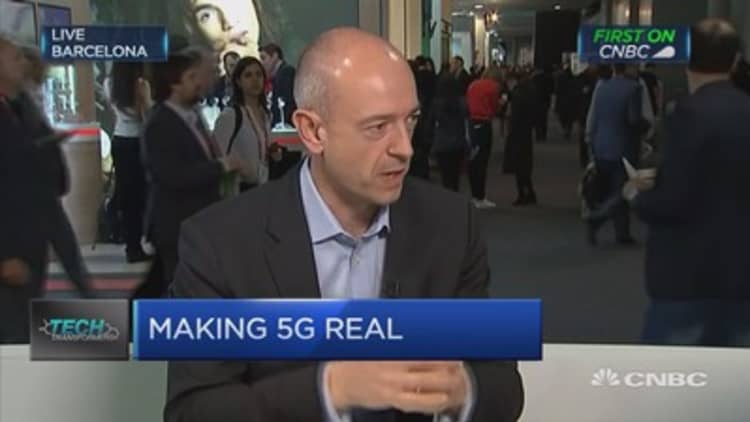Energy-efficient processors based on the Arm architecture could be more widely deployed after Amazon Web Services' introduction of Arm-based cloud-computing resources for developers this week.
The prospect of Softbank-owned Arm growing beyond consumer devices like smartphones and becoming a force in enterprise computing represents a challenge to Intel, whose processors are widely used inside servers operating in cloud and corporate data centers. Intel's data center group is its second-largest by revenue, making up 32% of Intel's revenue in Q3, and is growing faster than the company's still-larger business of making chips for PCs and other devices.
These chips reduce the total cost of ownership of the servers that encase them, which can in turn benefit customers, Matt Garman, AWS' vice president for compute services, told CNBC in an interview at the AWS re:Invent conference in Las Vegas this week.
Early feedback in just the few days since Amazon announced the chips has been positive, he said.
"I've seen Fortune 1000 big enterprises coming to us, saying, 'Holy cow, this it interesting for some Internet of Things use cases," he said. Don MacAskill, CEO of one of AWS' early customers, SmugMug, had been asking him for Arm-based chips on the Amazon cloud for the past six years, Garman said.
Some of the many AWS tools for developers, like the Lambda "serverless" computing service, could potentially run on the Arm servers in the future, even if most of Amazon's applications will keep using the popular x86 architecture that Intel's chips use for a long time, Garman said.
In addition to announcing the Arm chips this week, AWS also said that it will start offering servers that customers can install in their own data centers, for applications that just can't be run in the public cloud. From the AWS website, customers will be able to choose various types of EC2 computing instances that can be run, and from there, AWS will be able to deliver the right servers to meet companies' needs.
The plan is to allow customers to request instances that use the Arm chips, Garman said. In other words, AWS could widen the distribution of Arm through the server product well beyond its own corporate boundaries.
"Any instance that we have is the goal, whether it's Nvidia GPUs, whether it's Arm, whether it's Intel, as part of that service," Garman said.
So far, AWS instances using the Arm processors aren't performing as well as comparable instances that rely on Intel chips, according to tests that one person ran.
Still, the availability of Arm from the biggest cloud provider represents a win for Arm.
"AWS' embrace gives Arm the shot of credibility to expand its footprint into more cloud players and workloads," industry analyst Patrick Moorhead of Moor Insights & Strategy wrote in a message to CNBC on Friday.
In the years to come, AWS could release new instances based on more powerful Arm-based chips. The existing instances use Arm's Cortex-A72 system, which was introduced in 2015.
And Arm is working on new processor technology that could enable greater performance, the company's CEO, Simon Segars, told CNBC in an interview this week.
What's more, other cloud providers could start to release instances using technology from Arm, which was acquired by Softbank in 2016 for $32 billion.
"Microsoft has shown in the past the use of Arm processors in their infrastructure," Segars said. "They haven't had that commercially available, but they've shown what it can do."
With several big companies competing in the market for cloud infrastructure, competition is fierce, he said.
"If there's a way to offer the processing capability at lower cost, then I would think everybody that plays in that space would want to take advantage of it," Segars said.
WATCH: Company little changed after Softbank acquisition: Arm CEO



